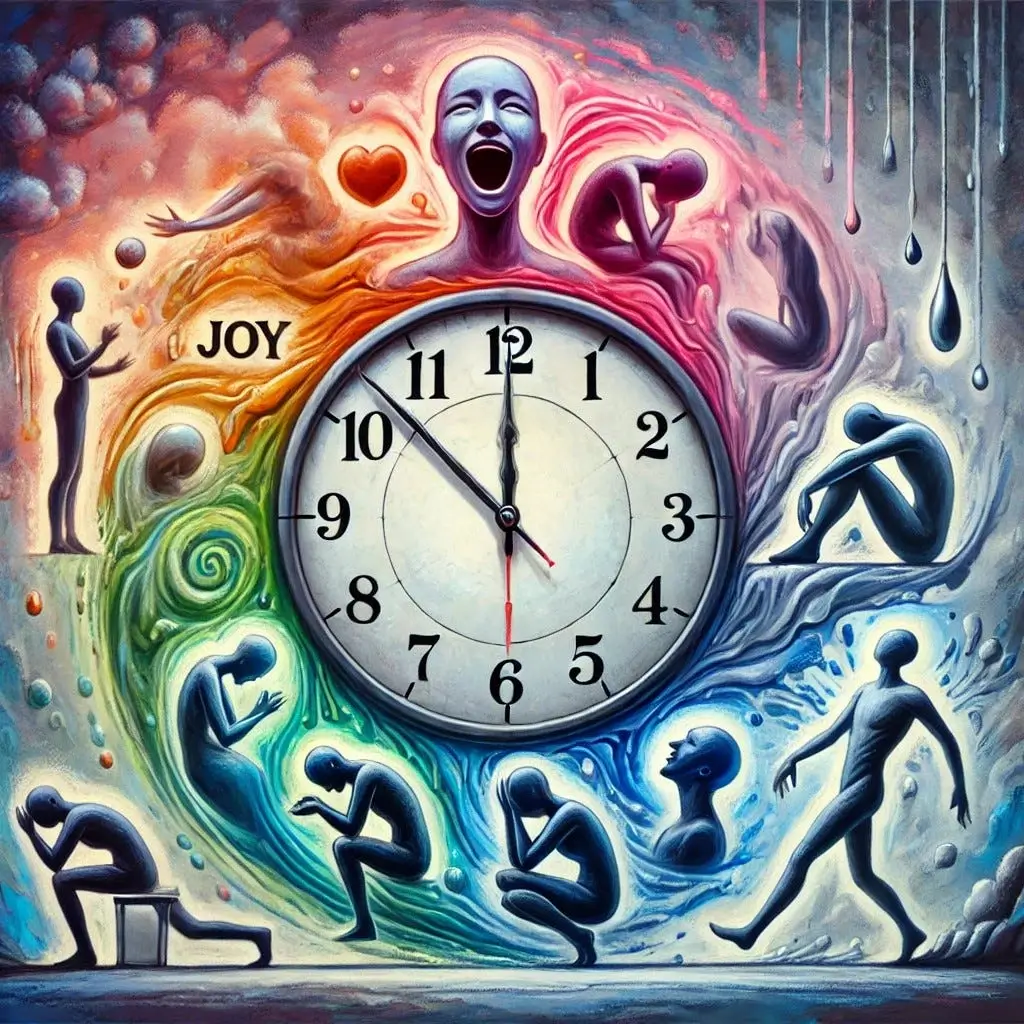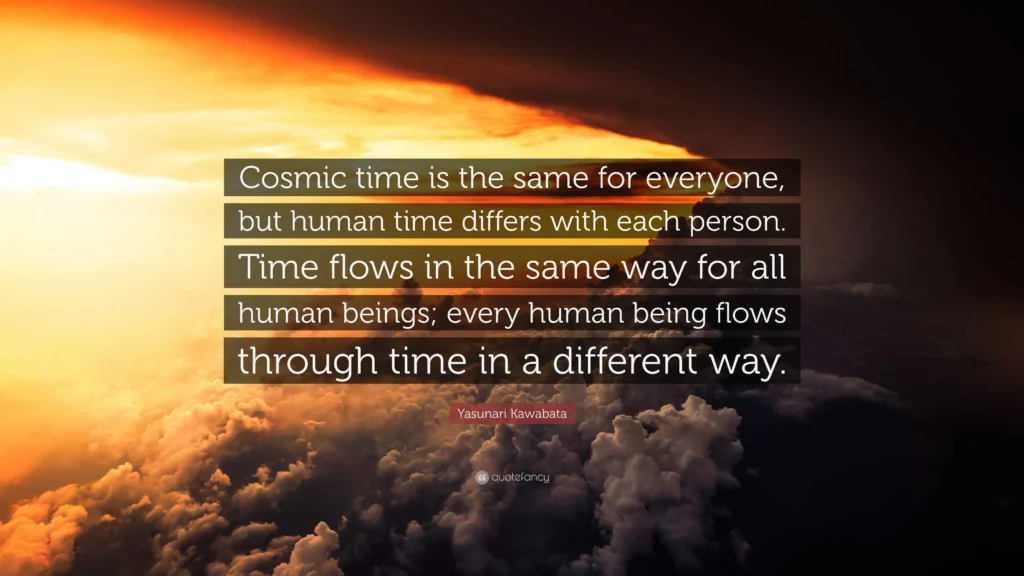
Time has always been confusing for humans. We measure time with clocks, but we experience time with feelings. Einstein’s theory of relativity made it clear that time itself is relative. Time is not absolute; it bends according to speed, gravity, and point of view. And in addition to it being a subject of physics, time can also be a source of psychological variation or distortion. How we experience time affects how we experience reality in our lives. Six psychological truths about time can be explored. The truths are grounded by science, by wisdom from Islam, and by raw cosmic mind-bending explorations.
Time Feels Different Based on Emotions
Have you ever noticed how happiness makes time fly? Joy condenses time. Sadness, on the other hand, stretches time. Modern psychology submits to this, too. A 2019 study in Frontiers in Psychology demonstrated how our time perception based on emotions is strongly distorted.
Furthermore, the Qur’an expresses this truth as well. “On the Day they see it, it will be as if they had not remained except an afternoon or a morning” (Qur’an 79:46). This verse illustrates how time feels based on inner states.
Interestingly, astronauts also report emotional distortions of time while in space. Reactions such as isolation, excitement, and fear manipulate how they experience hours.

Time Is Not Experienced In Uniform Real-Time By the Brain
Surprisingly, the brain does not have a main clock. Instead, different neural circuits measure time differently. This is why waiting for a bus feels interminable while long gaming sessions tend to evaporate. Neuroscientists at Duke University have found strong implications of dopamine in time judgment. During high dopamine levels, intervals seem shorter. During low dopamine levels, the intervals seem longer.
Correspondingly, in Islamic traditions, the times of prayers create spiritual rhythms, resetting the mental clocks of the believers. The Prophet ﷺ emphasized performing the Salah at its prescribed time, thus re-anchoring the believer to divine timing. By engaging in this activity to interrupt the daily flow of activity, they are establishing a point in time to regulate their psychological perception of hours.
For example, patients with Parkinson’s disease often cannot judge time accurately. Their damaged dopamine system can trick their perception of seconds and minutes. This demonstrates how fragile our internal clocks can be, just like Einstein said about relativity.
Read more: 7 Mind-Bending Lessons from Galileo
Memory Modes Our Past and Future Time
Here’s another true statement: memory leads to how long human experiences feel in hindsight. A boring week may feel long while you are living it. However, in retrospect, it feels short because few memories were formed. Similarly, a vacation may feel longer in retrospect, simply because there were so many experiences to draw memories from.
Psychologists have a term for this, “holiday paradox.” Even Einstein explained relativity with this concept: “If you sit with a pretty girl for an hour, it seems like a minute. If you sit on a hot stove for a minute, it seems like an hour.”
We see similar themes in the Qur’an about memory changing the way we perceive time. Allah says: “The Day He will call you, and you will answer His call, and you will think you relaxed only a little” (Qur’an 17:52). Human perception has the capacity to make entire centuries feel like mere moments.
Fun fact: Black holes have such a strong effect on time that a few seconds near a black hole will equal thousands of years somewhere else in the universe. Just think how memory would work there!
Stress Speeds Up the Inner Clock
When people are stressed, they perceive that time goes by much faster. Soldiers in war report that moments blur together, and students in examinations feel like hours collapse into minutes. Stressful moments often involve an increase in cortisol, a hormone that speeds up the brain’s internal clock.
In 2007, researchers at University College London found that stressed people consistently overestimate how much time has passed, comparing their cognitive perception to objective reality. Their minds mistakenly perceive that more time has passed than really has.
Islam acknowledges the way stress can corrupt perception of time. The Qur’an describes the Day of Judgment as lasting fifty thousand years (Qur’an 70:4), but for the righteous person, it will be felt as having gone by quickly. The distinction is in terms of mental and spiritual state.

Spirituality Can Expand or Contract Time
One psychological reality is that spirituality changes how we live moments. Practices of prayer, meditation, and dhikr can remove time altogether. A believer can lose hours in their worship and barely realize it. Psychologists call this state of mind “flow.” Flow occurs when the mind and soul are on a task together.
And as Einstein said, “The most beautiful experience we can have is the mysterious. It is the source of all true art and all science.” Spiritual flow is somewhat of the same—mysterious, and going beyond ordinary time.
The Qur’an also acknowledges this notion: “Indeed, in the remembrance of Allah do hearts find rest” (Qur’an 13:28). A heart that is well-rested sees time differently as it escapes the stresses of speeding up the clock and the drag of anxiety.
Did you know that astronauts who practice mindfulness while they are in space adapt much more smoothly to cosmic time? Their spirituality helps them endure long missions and exist in meaning without the ability to lose their mental balance.
Cosmic time is different from human time
Finally, the cosmos itself is an indicator that time is relative. A year on Earth has 365 days. A year on Jupiter is 12 years on Earth. Light from distant stars is delayed by millions of years from the original time till it reaches your eyes. When you look at the night sky, you are looking at ancient history.
Islam has a beautiful reverberation on this point. Allah says: “And indeed, a day with your Lord is as a thousand years of what you count” (Qur’an 22:47). Divine time is not human time. The Qur’an demonstrates cosmic relativity again and again.
A recent real-life case study: in 1971, scientists flew atomic clocks on airplanes. They noticed that their elapsed time measurement was materially different than Earth time. This demonstrated relativity not only in galaxies but in our average daily lives.

Conclusion: Living with Awareness in Time
Einstein told us that time is nothing if not formless and fluid. Recognized it lies woven with space, speed, gravity, and even human feelings. Likewise, psychology demonstrates how moments welling with pressure, pleasure, or leave a mark on memory help reconfigure our inner hours. And Islam tells us in the dualities of time, worldly time is temporary, divine time is infinite.
Consequently, every moment is precious. Once we accept the definition of relativity, we can better appreciate the now. The Qur’an calls out to believers, “So race to good deeds” (Qur’an 2:148). Time is both spinning wheels and stretched fabric. How we live it determines how we live. So, the next time it feels crushing or crawling, slow it down. Let Einstein, science, and the Qur’an echo the same secret: time is relative, but meaning is not.



Leave a Reply